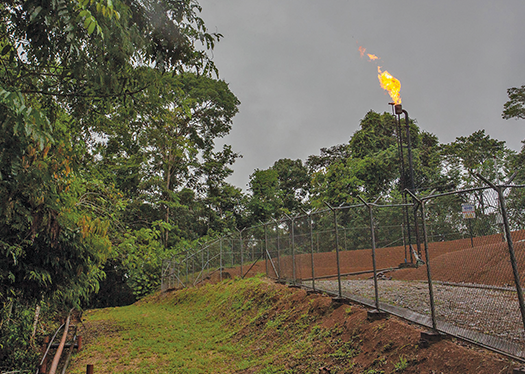
Flare stacks are a common sight in the oilfields of the Ecuadorian Amazon. (Photo by Iván Castaneira/Acción Ecológica)
While on a night-time visit to an oilfield in the Ecuadorian Amazon in the 1990s, famed entomologist Terry Erwin of the Smithsonian Institution saw insects swarming around a stack where natural gas was being flared. He approached the stack to collect samples of insects killed by the flame and was surprised by how many littered the ground, filling several bags with them. Acquaintances of Erwin, who died in May of this year, remember him saying that while it might appear that gas flaring poses a serious threat to insect populations in the Amazon, this view would be proved wrong in the future.
Three decades later, residents of Miwaguno, an indigenous Waorani community of 165 located in northeast Ecuador’s Amazonian province of Orellana, have launched a lawsuit over the practice, albeit with a broader phenomenon in mind. In a complaint filed on Dec. 10, they are pressing the Chinese-owned company PetroOriental to stop flaring and venting gas in Block 14, its oilfield concession area in Orellana, because it contributes to global warming.
The action against PetroOriental, a subsidiary of China National Petroleum Corporation (CNPC) and China Petrochemical Corporation (Sinopec), marks the first time a company in Ecuador has been sued in connection with climate change. Miwaguno is joined by three co-plaintiffs—the Paris-based International Federation for Human Rights, the Ecuadorian nonprofit Acción Ecológica and the Union of People Affected by Texaco, a local advocacy group seeking redress for decades of Ecuadorian Amazon oilfield pollution.
The community, which is located near the edge of Block 14 in Ecuador’s highly biodiverse Yasuní National Park, asserts that by contributing to climate change, the gas flaring threatens its subsistence.
The plaintiffs are asking that PetroOriental be ordered not only to shut down its flares, but also to finance local climate-adaptation projects. These projects would include efforts by the Miwaguno to preserve their food sovereignty; prepare for droughts and floods; strengthen techniques of ancestral medicine; and recover ancestral seed storage and distribution techniques.
The Waorani, the indigenous people of which Miwaguno residents are a part, number some 4,000 and live in three provinces of the Ecuadorian Amazon. Miwaguno residents subsist in large part by cultivating yucca and green plantain, whose yields have declined due to greater heat as well as heavier winter rains and associated flooding.
“Now the yucca and the green plantain [crops] produce 50% of [what they used to],” says Juan Enomenga, president of Miwaguno’s local governing body. “The environment is polluted by the flares, and because of the noise of the [oilfield] machinery, animals move away, which affects us a great deal.”
In late June, Miwaguno experienced severe flooding that destroyed crops as well as residents’ dwellings and belongings. Acción Ecológica member Alexandra Almeida asserts that the contribution of flaring to global warming is undeniable, as is the impact that climate change is having on Miwaguno. She cites testimony in the lawsuit by Ima Wini, one of the community’s elders, who describes how seasonal weather patterns have broken down.
“August [typically] was the dry season because everything dried up and it was noticeable because the ceibo (Erythrina crista-galli) sprouted and bloomed,” Wini is quoted as saying in the suit. “The rivers and streams dried up, and the fish died, and some guanacos appeared to eat the dead fish. In September, everything bloomed and in February it rained. Now, it rains in November and December. Now one doesn’t know when the rainy and dry seasons are. Everything has changed.”
Julio Prieto, an attorney representing the plaintiffs in the global-warming suit, says that while PetroOriental is not the only oil company that flares natural gas, Miwaguno is justified in seeking reparations from the biggest and closest contributor to global warming. Prieto says the company must help finance local adaptation programs, given its role in fueling climate effects that are hampering agriculture, hunting and other activities that Miwaguno residents depend on. “Nature’s balance is broken,” he says. “The company has to recognize the violation of the community’s rights.”
PetroOriental and other oilfield operators conduct flaring and venting to get rid of natural gas that rises to the surface with crude. Oil companies can—and sometimes do—bring gas to market instead of sending it skyward. But this can require significant investment if gas-transport infrastructure is not already available—investment that oil companies often are not willing to make.
The provincial court judge currently handling the climate litigation, Vicenta Cuaical, must formally accept the global warming suit in order for the case to proceed. Many experts say the plaintiffs’ legal prospects are uncertain, and they express skepticism that PetroOriental and other companies still flaring gas in the Ecuadorian Amazon will change their practices anytime soon. But some are optimistic that Miwaguno’s action could have a knock-on effect that could bring change.
“If the community wins the suit, it can serve as an example for legal claims from other communities,” says David Romo, co-director of the Tiputini Biodiversity Station, a research base in Yasuní National Park operated by the University of San Francisco of Quito.
For his part, Prieto says he hopes that PetroOriental “finds an opportunity to do things well and clean up its image.” He notes that the community is not demanding “millions of dollars of indemnification,” but, rather, asking the company to “help its neighbor live better and shut down the flares.”
- Mercedes Alvaro